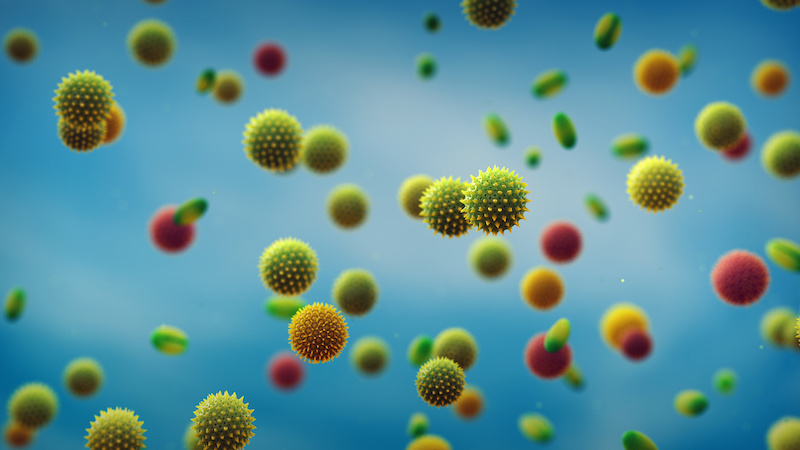Allergic rhinitis, also known as hay fever, is a very common issue, affecting around 1 in 5 Australians. Whilst many think of allergic rhinitis as occurring only in the Spring, it can be a year-round issue for many people, depending on the underlying allergen or irritant triggering the immune system to become reactive. This blog will look at both seasonal and perennial (year-round) allergic rhinitis, common triggers, and naturopathic treatment strategies to manage symptoms and return you to health.
What is Allergic Rhinitis?
Allergic rhinitis is essentially an allergic response by the immune system to an allergen or irritant. It falls under the umbrella of atopic conditions that can often occur together, along with asthma and eczema. These conditions often run in families, as there is a genetic component. Typically, allergic rhinitis is associated with the Springtime when the sudden increase in airborne pollens triggers immune activation in those with pollen allergies. However, as we often see in our naturopath clinic in Sydney, allergic rhinitis can be a year-round issue, as it is not only pollen that can trigger the condition. Many different allergens can cause hay fever-type symptoms, including:
- Pollen from trees, grasses, and other plants
- Animal dander
- Mould
- Dust mites
- Food allergies and intolerances can trigger or worsen rhinitis symptoms
- Non-allergic rhinitis can be triggered by irritants such as pollution, smog, smoke, and even strong odours
On a cellular level, symptoms are brought on by the release of the chemical histamine from mast cells, a type of immune cell that responds to the presence of allergens and other foreign particles in the body. It is histamine that causes the classic signs of allergic rhinitis – watery eyes, itchy skin, and a runny nose – because it causes our blood vessels to dilate. Symptoms can range from mild to severe and can impact on daily living and quality of life. Symptoms of rhinitis include:
- Watery eyes
- Runny nose
- Itching of the eyes, nose, and/or roof of mouth
- Sore throat
- Fatigue
- Cough and/or wheeze
Allergic rhinitis can also be associated with post-nasal drip coughs and even sleep apnoea. Nasal congestion can lead to oral dryness, blocked airways and even swelling of the tonsils and adenoids while you sleep. This can lead to symptoms of obstructive sleep apnoea, as the body triggers you to wake up from sleep multiple times through the night as a protective measure.

Is Allergic Rhinitis the Same as Sinusitis?
Allergic rhinitis and sinusitis are two different conditions; however, they can be related, and people can experience both conditions at once. Whilst allergic rhinitis is an immune response to allergen exposure, sinusitis is due to an infection, usually viral or bacterial. The infection causes inflammation of the innings in the sinuses, causing mucous build-up, post-nasal drip and a cough. However, the chronic congestion that can occur with allergic rhinitis can also lead to a sinus infection; chronic congestion means a stagnant build-up of mucous in the nasal cavities and sinuses.
This build-up provides an ideal breeding ground for bacteria and viruses, which can lead to infection developing. In fact, up to 80% of chronic sinusitis patients have an underlying allergy that has lead to their symptoms developing. This is why patients might experience both conditions at once, and why it is worthwhile excluding sinusitis as a cause of your symptoms. A co-occurring sinus infection may also mean that antimicrobial treatments might be needed for you, even if the root cause of your condition is an allergy.
Naturopathic Perspective
In addition to the allergic and non-allergic triggers listed above, naturopathically there are other factors that can play a role in allergic rhinitis.
Stress
Stress is a known immune suppressant and can wreak havoc on our health. Our body’s stress response is primed for acute stressors, such as attack by a wild animal. It prepares the body for fight or flight by suppressing all functions that aren’t necessary for immediate survival – including digestion and immunity. Unfortunately, in our busy, stressful modern lives, our sources of stress are often complicated and ongoing. Our bodies don’t get a chance to heal and be adequately relieved from stress for our immune system to properly do its job. The body is then more susceptible to illness, and issues such as allergic rhinitis can arise.
Histamine Overload
Histamine overload and histamine intolerance can be a hidden cause of allergic rhinitis symptoms. As discussed above, mast cells are one of the main producers of histamine in the body. These cells respond to germs and allergens in the body by releasing histamine, triggering an immune response and inflammation. It is histamine that causes the classic signs of allergic rhinitis – watery eyes, itchy skin, and a runny nose – because it causes our blood vessels to dilate. If we already have high levels of histamine due to a high histamine diet, or else have a low threshold for histamine (e.g. histamine intolerance), then even brief, transient exposure to irritants will trigger symptoms.
Poor Gut Health
The gut is one of the most important parts of the body for regulating the immune system, and good gut health is crucial for overall health. When the gut is impaired, such as due to an imbalance of gut bacteria or poor digestion, the lining of the gut can become damaged and porous, allowing the absorption of potentially harmful food particles and toxins that can trigger an immune response and lead to rhinitis symptoms. In addition, chronic gastrointestinal inflammation and imbalanced gut bacteria (known as dysbiosis) actively suppress immune system function, making it even more difficult for the body to heal.
Immune Dysregulation
Allergic reactions are a sign that your immune system is working overtime. There are a vast range of issues that can impact immune health, from stress to lifestyle issues to underlying chronic disease. Because immune system dysregulation is one of the primary drivers behind allergic rhinitis, supporting the immune system is a key component of naturopathic treatments for the condition.
Lymphatic Congestion
The lymphatic system is the highway on which our immune cells travel throughout the body. It relies on both adequate hydration and sufficient physical activity in order to work properly. If either of these factors are jeopardised, the lymphatic system can become sluggish and congested. This can be an issue particularly with conditions such as allergic rhinitis, as lymphatic congestion can worsen symptoms like mucous build-up, and means pollen and other irritants are stuck in our system for longer.
Structural Issues
Structural issues such as a deviated septum can mimic or worsen allergic rhinitis symptoms. If these are a possible issue for you, referral to an ENT will be required.
Naturopathic Testing
Because there are such a wide range of potential triggers for allergic rhinitis, testing can play an important role in determining the best treatment strategy to help you improve your symptoms. Allergy and food intolerance testing can help to identify the specific triggers that are causing your symptoms so that they can be eliminated from your diet and lifestyle and looking at nutrient deficiencies is also important as certain nutrients are critical for your immune system to be more balanced as opposed to overreacting.
Dietary Treatment Strategies
Naturopathic treatment strategies include a detailed investigation on diet as it is unique to each person. Identifying trigger foods through testing and elimination can make an enormous difference in addition to reducing foods and substances that may suppress your immune system.
There is also a range of foods that cause excess mucus production and foods that are high in histamine. When you are battling hay fever, the last thing you need is additional histamine being created by what you eat.
And whilst supporting you around what not to eat, it is equally important to eat healthy food that nourishes your immune system, supports healthy digestion, feeds healthy bacterial species and more.
Diet is complex and one size does not fit all when it comes to allergy and hay fever, however some of the common food triggers for allergy sufferers include:
- Common food allergens, such as wheat, cow’s milk, soy, fish, nuts, wheat, and peanuts
- Certain food additives or food colours
- Foods containing high levels of salicylates, such as citrus, berries, tomatoes, eggplant, chillies, and herbs (except parsley)
- Foods high in amines, including aged cheese, preserved meats, bananas, tinned fish, beer, chocolate, pre-packaged ready meals, fermented foods, and leftovers (especially when more than 24 hours old)
- Foods high in glutamates, including MSG, celery, and tomatoes
Lifestyle Strategies
Again, this requires a thorough investigation and often testing is recommended for accuracy however some common strategies include:
Reduce Exposure to Dust Mites in the Home
Reduce Your Exposure to Pollen and Other Environmental Triggers
Reduce Stress
Exercise Daily
Supplements & Herbal Medicines
Herbal medicines are a great tool for relieving rhinitis symptoms and returning the body back to balance. Some herbs that may be used include:
- Immune-regulating and anti-allergic herbs, such as echinacea
- Anti-inflammatory herbs, such as liquorice or chamomile
- Anti-catarrhal herbs (to reduce mucous overproduction), such as eyebright or elderflower
- Lymphatic herbs, such as stinging nettle and calendula
- Anti-microbial herbs to address any underlying infections, such as garlic, golden seal, or thyme
- Anti-anxiety and calming herbs for the role that stress plays and herbs to support a good night’s sleep such as ashwagandha, lavender, Siberian ginseng.
- Demulcent herbs, such as liquorice or marshmallow, especially if asthma is also an issue for you
Nutrients that are critical for a healthy immune response, reducing stress, improving sleep and digestive health may include Zinc, Vitamin C, Vitamin D however a review on where you are deficient is critical for a treatment plan that is specific to your needs.
Should you require a detailed and thorough investigation and naturopathic support on managing your hay fever or allergies, please contact me on [email protected] or book an initial consultation via the contact details on my website. You may want to visit my award winning naturopath clinic in Stanmore in Sydney’s Inner West to see how we can help you.











